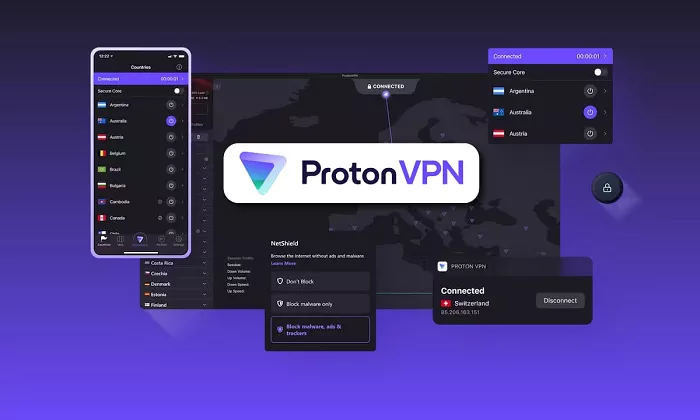Proton VPN is a widely recognized Virtual Private Network (VPN) service developed by Proton AG, the same company behind Proton Mail. It offers users secure and private internet access, enabling them to protect their online activities from surveillance and access content without geographical restrictions. However, like other VPN services, Proton VPN can be subject to blocking by governments, organizations, and network administrators aiming to control or restrict internet access. This article explores the mechanisms behind VPN blocking, instances where Proton VPN has been blocked, the methods employed to enforce such blocks, and the strategies Proton VPN utilizes to mitigate these restrictions.
What is VPN Blocking
VPN blocking refers to the techniques employed by authorities or network administrators to prevent users from accessing VPN services. This is often done to enforce censorship, maintain network security, or comply with legal regulations. Understanding the methods used to block VPNs is crucial for comprehending the challenges faced by services like Proton VPN and the countermeasures they implement.
Common Methods of VPN Blocking
IP Address Blocking: One of the most straightforward methods to block VPNs is by identifying and blocking the IP addresses associated with VPN servers. Since VPN providers often use specific IP ranges, network administrators can blacklist these addresses, preventing users from establishing connections.
Port Blocking: VPN protocols operate over specific network ports. By blocking these ports, administrators can disrupt VPN traffic. For example, OpenVPN commonly uses port 1194, and blocking this port can hinder OpenVPN connections.
Deep Packet Inspection (DPI): DPI is an advanced method where data packets transmitted over a network are examined in detail. This technique allows the identification of VPN traffic based on patterns and signatures unique to VPN protocols. Once detected, this traffic can be blocked or throttled.
DNS Filtering: By manipulating the Domain Name System (DNS), authorities can block access to VPN websites or servers. This prevents users from resolving the domain names associated with VPN services, effectively hindering their ability to connect.
Protocol Identification and Blocking: Some VPNs use specific protocols like PPTP, L2TP, or IKEv2. Network administrators can identify and block these protocols to prevent VPN usage.
SSL/TLS Interception: Since many VPNs use SSL/TLS for encryption, intercepting and inspecting these encrypted connections can help identify VPN traffic. Once identified, such traffic can be blocked.
Traffic Analysis: By analyzing traffic patterns, such as packet size and timing, network administrators can infer the use of VPNs even if the data is encrypted.
Application Layer Blocking: Some networks deploy application-layer firewalls that can detect and block VPN applications based on their signatures.
Instances of Proton VPN Being Blocked
Proton VPN has faced blocking attempts in various countries, reflecting the ongoing global struggle between internet freedom advocates and authorities seeking to control digital information flow.
Russia
In June 2022, Russia’s Federal Service for Supervision of Communications, Information Technology, and Mass Media (Roskomnadzor) announced efforts to block VPN services, including Proton VPN, that allowed users to access prohibited content. Russian users reported difficulties connecting to Proton VPN during this period. The Russian government has been known to implement strict internet censorship laws, and the blocking of VPN services aligns with their efforts to control access to information.
India
In May 2022, Indian authorities threatened to ban VPN services that refused to store user data. Proton VPN, along with other major providers, opposed these regulations, viewing them as threats to user privacy. The Indian government’s directive required VPN providers to maintain logs of user activities, which contradicts the fundamental principles of VPN services that prioritize user anonymity and privacy.
Belarus
In November 2019, the Belarusian government temporarily blocked Proton Mail and Proton VPN without providing specific reasons. The block was lifted after four days. While the exact reasons for the block were not disclosed, it is speculated that the Belarusian government aimed to suppress tools that could facilitate anonymous communication and access to uncensored information.
Myanmar
In February 2023, Myanmar’s military government enacted a new cybersecurity law imposing broad censorship and aiming to control the flow of information. The law targeted communication methods and service providers like VPNs, which help users bypass network restrictions. Enforced since its enactment, the law included penalties such as warnings, fines, suspensions, and blacklisting for digital platforms failing to prevent or remove “disinformation” and “rumors.” Service providers were required to retain user data for three years and disclose it to authorities if requested. The law allowed the government to investigate, block, and shut down digital platforms for national security, penalized unlicensed VPN services, and imposed severe punishments for unauthorized online activities linked to organized crime. This move followed previous attempts to curb internet use and resist online dissent, highlighting the regime’s efforts to maintain control since its 2021 coup.
How Proton VPN Mitigates Blocking
Proton VPN employs several strategies to help users bypass censorship and access the internet freely. These measures are continually updated to adapt to evolving censorship techniques.
- Alternative Routing: Proton VPN utilizes different server routes to avoid detection. By dynamically changing the paths through which data is transmitted, the service can circumvent IP blocks and other restrictions.
- Stealth Protocols: Implementing protocols designed to disguise VPN traffic as regular internet traffic, Proton VPN makes it more challenging for DPI systems to identify and block VPN usage.
- Tor Integration: Proton VPN allows users to route their traffic through the Tor network for added anonymity. This integration provides an additional layer of obfuscation, making it harder for authorities to trace user activities.
Conclusion
While Proton VPN can be blocked by authorities employing various techniques, the service continually develops methods to help users circumvent such restrictions. However, the effectiveness of these measures depends on the specific blocking techniques used and the resources available to both Proton VPN and the entities attempting to enforce the blocks.

